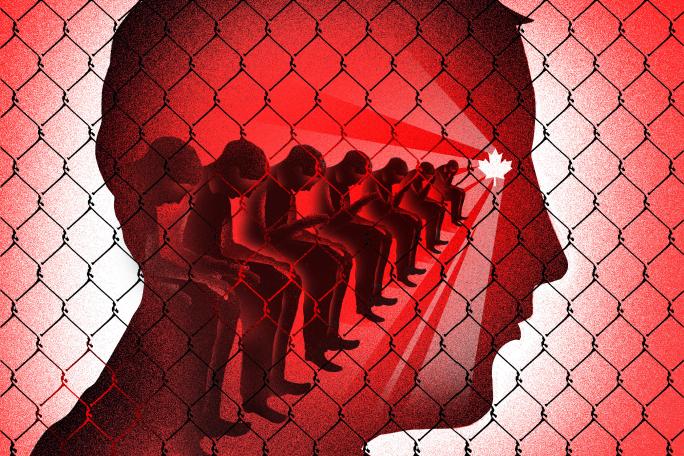By Efrat Arbel
Most people would probably be shocked to learn that every year, Canada locks up hundreds of migrants and refugee claimants in maximum-security jails. Even more shocking is that Canada jails these newcomers under immigration law – without a trial or even a charge – minus any of the due process that those accused of crimes receive. There are no time limits: detention can occur indefinitely.
Canadian law allows authorities to detain newcomers on immigration-related grounds – for example, if they are unsure as to the person’s identity, or if they believe the person is inadmissible, poses a danger, or is unlikely to appear for immigration proceedings – in facilities designed for criminal punishment. For decades, this has occurred in overcrowded facilities, where immigration detainees are co-mingled with prison populations, receive inadequate health care and have little to no contact with the outside world. Racialized people and those with mental-health conditions are habitually incarcerated for longer periods of time and endure harsher conditions of confinement when compared with other detainees. Many languish in lockdowns and solitary confinement, with no end in sight. All are routinely dismissed, degraded and demeaned, as chronicled by Human Rights Watch and Amnesty International in a recent report.
The problems of immigration detention have received intense critical scrutiny for years – detainees have launched protests and hunger strikes, advocates have launched law reform campaigns, and lawyers have launched lawsuits. In 2016, after a series of deaths in detention, the federal government declared that it “can and must do better” and launched the National Immigration Detention Framework, a five-year, $138-million undertaking designed to create a “better, fairer immigration detention system that supports the humane and dignified treatment” of detainees. Despite this initiative now coming to a close, not enough has changed.
In fact, one of the most egregious, most inhumane practices of immigration detention – holding migrants and refugee claimants in correctional facilities – has only intensified. Between April and September, 2020, for example, while the number of immigration detainees decreased, the portion of detainees held in provincial jails jumped from roughly 20 to 50 per cent. In the same period, the average length of detention also increased significantly – more than doubling when compared with before the pandemic. This means that authorities now rely as heavily on jails as on immigration holding centres to house immigration detainees.
Studies confirm that immigration detention causes serious harm: anxiety, depression, despair, psychological distress, psychosis, catatonic withdrawal, self-harm and suicidal ideation. The mental-health impacts of detention are so severe that even a short stint can be devastating to the mind and cause long-term – and sometimes permanent – damage. Detainees experience these harms no matter where they are held, but the research has long confirmed that detainees are affected most acutely when they are held in jails.
How can a country like Canada, one that prides itself on its commitment to human rights and refugee protection, continue to engage in such violations? One explanation is that year after year, each of the entities involved in immigration detention has passed the buck to another. The federal government has passed the buck to the Canada Border Services Agency (CBSA), which is tasked with enforcing immigration detention. The CBSA, in turn, has passed the buck to the provinces, by entering into memoranda of understanding or informal arrangements with the provinces that authorize immigration detention in provincial jails. As a result of these agreements, the CBSA maintains, it has “limited control over detention conditions” in provincial jails, and is unable to intervene in their operations.
But what about the provinces? In a new campaign, Human Rights Watch and Amnesty International have turned the spotlight on their role. The groups are calling on provincial premiers and corrections ministers to cancel all existing arrangements with the CBSA that authorize detaining migrants and refugee claimants in jails. The groups make clear that by maintaining these agreements, the provinces are complicit in continuing human-rights violations.
And they are right. Five years after launching its reform initiative, and despite the promise to “do better,” the federal government has allowed the most pernicious and violent aspects of immigration detention to thrive. But the success of some recent reforms show that change is possible. It is time for authorities to stop abdicating responsibility. The provinces can and must take the lead and end the devastating practice of detaining migrants and refugee claimants in jails once and for all.
Efrat Arbel is an associate professor at the University of British Columbia’s Peter A. Allard School of Law.
This article originally appeared in the Globe and Mail.






















